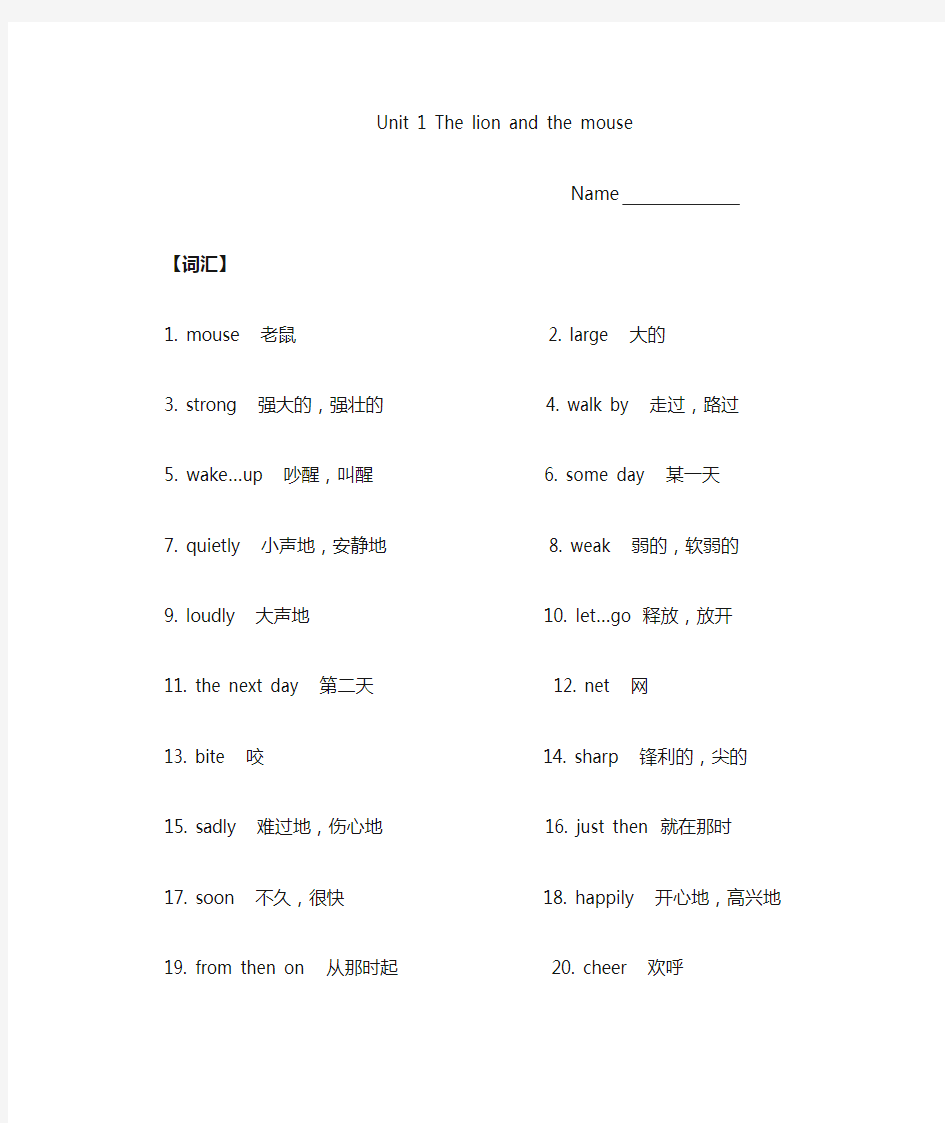

Unit 1 The lion and the mouse
Name
【词汇】
1. mouse 老鼠
2. large 大的
3. strong 强大的,强壮的
4. walk by 走过,路过
5. wake…up 吵醒,叫醒
6. some day 某一天
7. quietly 小声地,安静地
8. weak 弱的,软弱的
9. loudly 大声地 10. let…go 释放,放开
11. the next day 第二天 12. net 网
13. bite 咬 14. sharp 锋利的,尖的
15. sadly 难过地,伤心地 16. just then 就在那时
17. soon 不久,很快 18. happily 开心地,高兴地
19. from then on 从那时起 20. cheer 欢呼
21. hit 打,击 22. deep 深的
23. reach 够得着 24. quickly 迅速地,快地
25. pour…into 把……倒入 26. excitedly 激动地,兴奋地
27. lollipop 棒棒糖 28. Aesop’s Fable 伊索寓言
29. idiom 成语 30. finally 最后
【词组短语】
1. make a study plan 制定学习计划
2. in the forest 在森林
3. large and strong 大而壮
4. one day 有一天
5. walk by 路过,走过
6. wake sb. up 吵醒某人
7. some day 将来某一天 8. say quietly 轻声地说
9. small and weak 小而弱 10. laugh loudly 大声地笑
11. let…go释放,放开 12. the next day 第二天
13. two men 两个人 14. catch sb. with sth. 用某物抓住某人
15. bite sth. with one’s sharp teeth 用尖利的牙齿咬开某物
16. get out 出来 17. ask sadly 伤心地问18. just then 就在那时 19. make a big hole 弄出了大洞
20. say happily 高兴地说 21. from then on 从那时起
22. become friends 成为朋友 23. play table tennis 打乒乓
24. be good at 擅长 25. cheer for sb 为某人欢呼
26. hit sth hard 使劲地打 27. a hole in the ground 地上一个洞
28. can’t reach sth 够不到某物 29. have an idea 有办法,有主意
30. bring some water quickly 很快取来一些水
31. pour… into the hole 把某物倒进洞里
32. Well done. 干得好 33. last Sunday 上个星期天
34. go to the shopping centre 区购物中心 35. look sad 看上去很伤心
36. go to sb. 朝某人走去 37. help sb. up 帮某人起来
38. take sb to an office 将某人带到办公室 39. become happy 变得开心
40. like helping people 乐于助人 41. talk soon 尽快回复
【语法】
一、副词
在旧教材5BUnit4里学生已经学过了一些副词,所以本单元的语法对学
生来说并不陌生。老师们可以将以前学过的一些内容给学生复习一下。如: dance beautifully, sit quietly, run fast, walk carefully, jump high
1. 副词(Adverb)是指在句子中表示行为或状态特征的词,是一类用
以修饰动词(相当于英语的verb)或加强描绘词组或整个句子的词。
目前我们学过的副词有:
时间副词:now, then, often, always ,usually, early, today, next, soon, too, finally, before, ago, sometimes, yesterday
地点副词:here, there, in, out, inside, home, around, near, off, past, up, away, on.
方式副词:carefully, fast, well, slowly, hard, quietly, loudly, sadly, happily…
程度副词:much, very, so, too, quite.
疑问副词:how, when, where, why.
表顺序的副词:first, then ,next, finally
2. 副词在句中可作状语、表语、补语、定语。
1) 在许多情况下,副词都放在所修饰的动词后面或句末。如:
The girl dances very well. 这个女孩跳舞跳得好。
We must work hard. 我们必须努力工作。
He does his work very carefully. 他做工作非常仔细。
I want to see the film very much. 我很想看这部电影。
2) 有时也放在主语后面,谓语动词前面(对动作加以强调)。如:
He angrily closed the door. 他生气地把门关上了。
3) 置于句中的副词,若碰上助动词,则通常放在助动词之后、主要动词之前:
He is often late for school. 他经常上学迟到。
He can also play basketball. 他还会打篮球。
3. 本教材中主要学习由形容词变副词的方法和用法。
形容词变副词的规则:
1)一般情况下直接加“ly”,如quick—quickly
2)以“y”结尾的, 先将“y”改成“i”,再加“ly”,如happy—happily 少数以e结尾的形容词,要去掉e再加-ly。例如:true(正确的)— truly 等。
但绝大多数以e结尾的形容词仍然直接加-ly。例如:polite(礼貌的)—politely等。
3)在英语中, 有些词既可以作形容词, 又可以作副词, 如early, much, fast, little, hard等。
4)还有一类副词和形容词词义相同, 但拼写却不同, 如well和good。如:
He speaks good English. 他讲一口流利的英语。
He speaks English well. 他英语讲得不错。
5)需注意: friendly; motherly; lovely等词尽管是以“ly”结尾,但他们是形容词而非副词,如要变为副词则为:friendly—friendlily 小结:形容词变副词
angry—angrily beautiful—beautifully busy—busily careful—carefully cold—coldly
cool—coolly cute—cutely dead—deadly deep—deeply excited—excitedly early—early
fast—fast final—finally first—first good—well happy—happily hard—hard
healthy—healthily heavy—heavily high—high
hungry—hungrily late—lately
loud—loudly near—nearly new—newly quick—quickly quiet—quietly real—really
sad—sadly safe—safely useful—usefully usual—usually warm—warmly
二、动词过去式不规则变化
bite—bit let—let wake—woke catch—caught say—said see—saw make—made
get—got become—became eat—ate come—came hit—hit find—found have—had
bring—brought take—took give—gave
【句子分析】
1. Make a study plan. 制定学习计划,让学生形成良好的学习习惯。
2. One day, a mouse walked by and woke the lion up. 一天,一只老鼠从狮子身边走过并吵醒了狮子。
I can help you some day. 将来某一天我会帮你的。
1)one day一般在讲故事时经常会说到,表示的是过去有一天。
some day通常指将来某一天。
例如:One day, a monkey met a lion. 有一天,一只猴子碰到了一只狮子。
I hope I can go to the moon some day. 我希望将来有一天能到月球上去。
2)wake sb up 将某人吵醒,如果后面跟人名,就要把人名放在后面,例如:
Wake up Mike. It’s eight o’clock. 把迈克叫醒,已经8点了。也可以直接说wake up,例如:
Wake up, please! It’s eight o’clock. 醒醒。已经8点了。
3. The next day, two men caught the lion with a large net. 第二天,两个人用大网抓住了狮子。
1)the next day是指过去时态中的第二天,表示将来的第二天为:tomorrow。例如:
The next day, I went to the park. 第二天我去了公园。
I’m going to the park tomorrow. 我明天打算去公园。
2)men是man(男人)的复数形式。以此相应的名词变复数还有:
woman—women, policeman—policemen, policewoman—policewomen 我们学过的名词复数特殊变化的还有:
child—children, tooth—teeth, foot—feet …
4. Sam is too excited and he hits the ball hard. 山姆太兴奋了,他使劲地把球打了出去。
句中hard是副词,表示努力地,使劲地,hard也可以作形容词,表示“硬的”,例如:
We must study hard. 我们必须努力学习。
The bed is very hard. 这床很硬。
5. Finally, Sam and Bobby find a hole in the ground. 最后,山姆和波比发现地上有个洞。
此句中hole不是在地面上,而是在地里面,所以我们要用介词in,同样的如:
a hole in the wall 墙上的洞 a hole in the ice 冰上的洞
6. He brings some water quickly an pours it into the hole. 他很快地取来一些水,将水倒进洞里。
bring和take的区别
bring意思是带来,拿来,取来,指从别处把某人或某物带到或拿到说话者所在的地点来。例如:
I’m hungry. Please bring some bread for me. 我饿了。请带些面包给我。
I’m ill. Can you bring me some fruit 我病了。你能给我带些水果吗
take意思是带去,拿走,和bring相反,指从说话者所在地把某人或某物带去或拿走。例如:
We'll take the students to the zoo.我们将带学生到动物园去玩。Sam took my storybook.山姆把我的故事书拿走了。